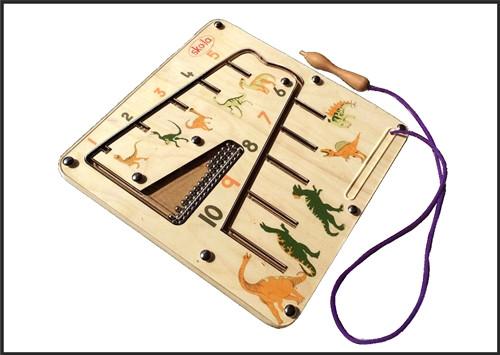“Five little monkeys jumping on the bed, one fell down and bumped his head…”
“One, two, buckle my shoe. Three, four, shut the door…”
“Five green and speckled frogs…”
“There were ten in the bed and the little one said - roll over, roll over…”
Since time immemorial, these have been some evergreen favorites sung and enjoyed time and again by preschool children everywhere. What makes these songs irresistible to children? Yes, they rhyme. Yes, funny things take place in them. But they also feature numbers and counting. It is the counting-up and the countdown that adds to the mystery, magic, and allure of these rhymes. Children as young as two can comprehend that the numbers change in these songs and they demonstrate this by holding up the right number of fingers as they sing. They also understand that the numbers mean something. And they wait with excitement for the count-up and countdown. That is how early children show a predisposition to learn math skills.
The importance of math
Math is the foundation of all knowledge and learning. Most things in life require an understanding of math. Early math skills are important to develop for later school readiness and academic success. When preschoolers are exposed to math in a fun way, it sets the stage for applying that math knowledge in a more formal classroom setting once they are older.
Contrary to general assumptions, even very young children have inherent abilities to comprehend math concepts. This is because children are exposed to addition and subtraction during their daily routines and interactions. They learn number names and counting when they count the steps they climb, the number of spoonfuls left over to finish a meal, figure out how to share sweets or toys with others, play snakes and ladders, and of course, sing rhymes with numbers.

Image courtesy: http://www.freeimages.com/photo/abacus-1193093
Research from renowned bodies like the NAEYC (National Association for the Education of Young Children) has consistently shown that encouraging children’s encounters with math in everyday life develops their curiosity, critical thinking, analytical skills, and problem-solving abilities. The right stimulation of math skills at a tender age enables children to appreciate the fascinating world of mathematics and understand more complex concepts in advanced classes.
How to develop early math skills in children?
Early math skills include:
- Recognizing numerals and associating number names with them
- Recognizing the number sequence, for example, what number comes before or after another
- Being able to count forwards and backwards verbally
- Identifying more or less of a quantity
- Grouping objects
- Understanding shapes and sizes
- Understanding number patterns

Image courtesy: https://www.flickr.com/search/?text=children%20math&license=2%2C3%2C4%2C5%2C6%2C9
Good preschool programmes for children as young as toddlers include counting and numbers in many indirect ways. There are a variety of activities and toys that can be used to develop math skills in children.
- Count everything! Children love to count over and over again. Count at every opportunity - the number of biscuits on their plate, the number of bananas in the basket, the number of trees around them. The more they count, the more children associate number names with quantity - a critical concept in math.
- Object search: Encourage children to look around the house or classroom for objects of a particular shape. They can also search for and group together objects of a particular colour, and count how many objects they found.
- Spot the Number! When children have learnt numbers, ask them to spot particular numbers on sign boards or on number plates of vehicles.
- Patterns: Encourage children to recognize and create patterns. Give them household objects such as clips, pens, blocks, spoons and forks and invite them to form patterns.
- Puzzles: Puzzles of all types encourage the development of spatial skills, shape recognition, and matching - all fundamental math skills.
- Cooking: Have children measure out the ingredients for simple recipes using cups and spoons. This will not only delight them but also introduce the concept of measurement in a fun way.
- Using math-specific educational toys: There are many innovative toys that engage children meaningfully while stimulating and sharpening their numerical abilities.
The Dino Magnetic Number Maze
This exciting maze with its magnetic pen and steel balls introduces children to number sequence and counting. It also doubles up as an excellent pre-writing toy. The toy consists of a wooden board provided with an acrylic cover and steel balls that can be moved around the maze using the magnetic pen provided. The shape of the magnetic pen helps children develop their pencil grip.
The number maze features the numbers 1-10 in a visually appealing manner . Sequencing numbers correctly is a skill that is critical to knowing which number comes before and after a particular number. As children place the balls into slots in order from 1 to 10, it promotes the natural learning of the sequence of numbers. The Dino Maze is self-correcting because each slot provided will hold only as many balls as the number indicates. It encourages homogenous counting wherein children count the same type of objects. As children need to move one ball for every count, it makes them count slowly and without skipping numbers. As a result, children learn the one-to-one correspondence between a number name, its symbol, and the quantity associated with it.
The Dino Maze naturally enhances children’s concentration and attention span. Another fun way to use this activity is to identify the various types of dinosaurs on the board, making it a perfect combination of learning and fun.
Image courtesy: https://www.skola.toys/products/dino-magnetic-number-maze



